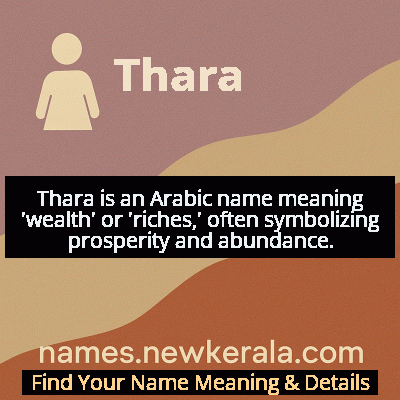Thara Name Meaning & Details
Origin, Popularity, Numerology Analysis & Name Meaning of Thara
Discover the origin, meaning, and cultural significance of the name THARA. Delve into its historical roots and explore the lasting impact it has had on communities and traditions.
Name
Thara
Gender
Female
Origin
Muslim
Lucky Number
3
Meaning of the Name - Thara
Thara is an Arabic name meaning 'wealth' or 'riches,' often symbolizing prosperity and abundance.
Thara - Complete Numerology Analysis
Your Numerology Number
Based on Pythagorean Numerology System
Ruling Planet
Jupiter
Positive Nature
Optimistic, inspirational, and creative.
Negative Traits
Scattered, exaggerating.
Lucky Colours
Yellow, gold, purple.
Lucky Days
Thursday.
Lucky Stones
Yellow sapphire.
Harmony Numbers
1, 2, 9.
Best Suited Professions
Arts, writing, communication.
What People Like About You
Creativity, optimism.
Famous People Named Thara
Thara Jordan
Actress and Model
Known for her roles in Middle Eastern television dramas and fashion campaigns
Thara Al-Mansouri
Businesswoman
Founder of successful luxury retail chain in the Gulf region
Thara bint Ahmed
Islamic Scholar
Renowned for her work in Islamic education and women's empowerment programs
Thara Mohammed
Journalist
Award-winning correspondent covering social and political issues in Muslim communities
Name Variations & International Equivalents
Click on blue names to explore their detailed meanings. Gray names with will be available soon.
Cultural & Historical Significance
In contemporary Muslim culture, Thara represents a bridge between tradition and modernity. While maintaining its classical Arabic elegance, the name appeals to modern sensibilities through its positive connotations of empowerment and success. The cultural significance extends beyond individual families to community values—naming a daughter Thara expresses collective aspirations for feminine strength, economic independence, and leadership. This reflects evolving attitudes toward women's roles in Muslim societies, where names like Thara symbolize the harmonious integration of traditional values with contemporary ambitions for female achievement and contribution to society.
Extended Personality Analysis
Individuals bearing the name Thara are typically characterized by a remarkable blend of practicality and vision that serves them well in various aspects of life. Their inherent association with 'wealth' often manifests as an ability to recognize and cultivate value—whether in relationships, opportunities, or resources. Tharas tend to be natural organizers with sharp analytical minds, enabling them to assess situations accurately and make informed decisions. They frequently demonstrate financial intelligence and strategic thinking, combined with emotional depth that makes them excellent judges of character.
Socially, Tharas often possess magnetic personalities that draw people toward them, yet they maintain discernment in their relationships. They're typically generous but not wasteful, understanding the balance between giving and preserving resources. Their leadership style tends to be inclusive and empowering, focusing on creating abundance for their entire community rather than hoarding advantages for themselves. Many Tharas exhibit entrepreneurial spirit or creative talents that allow them to generate prosperity through innovation. They usually approach challenges with resilience and optimism, viewing obstacles as opportunities for growth. This combination of practical wisdom, emotional intelligence, and visionary thinking makes Tharas particularly effective in roles requiring both management skills and human connection.
Modern Usage & Popularity
In the contemporary naming landscape, Thara maintains its cultural authenticity while adapting to global naming trends. The name has experienced steady popularity in Muslim-majority countries, particularly in the Gulf region and Southeast Asia, where traditional Arabic names remain preferred choices. Recent years have seen Thara gain traction among Muslim diaspora communities in Western countries, where parents seek names that honor heritage while being accessible to multicultural environments. Social media platforms and international connectivity have increased Thara's visibility, with many young professionals and influencers bearing the name building substantial online followings. Modern usage reflects evolving attitudes—where once names primarily honored religious figures, contemporary parents increasingly choose names like Thara for their positive meanings and elegant sounds. The name's association with prosperity and success resonates particularly well in urban, educated Muslim communities where female achievement is celebrated. Current naming data indicates Thara ranks consistently within popular name choices in countries like Malaysia, Indonesia, Saudi Arabia, and the United Arab Emirates, with growing recognition in European and North American Muslim communities.
Symbolic & Spiritual Meanings
The symbolic resonance of Thara extends far beyond its literal translation of 'wealth,' encompassing rich metaphorical dimensions that reflect Islamic worldview and universal human aspirations. Symbolically, Thara represents the fertile ground from which blessings and opportunities grow—echoing agricultural imagery found in Quranic descriptions of paradise and earthly abundance. The name embodies the concept of 'multiplication through sharing,' where resources increase in value when distributed ethically and compassionately. In Islamic symbolism, Thara suggests the spiritual treasures that accumulate through righteous living—good deeds, knowledge, and faith being the true wealth that transcends material possessions.
Metaphorically, Thara represents the inner resources that enable human flourishing: resilience in adversity, wisdom in decision-making, and generosity in prosperity. The name symbolizes the Islamic principle that worldly wealth is a trust from God, to be used for personal development and community welfare. Thara also embodies the balance between material and spiritual prosperity—the ideal of enjoying worldly blessings without becoming enslaved by them. This symbolic richness makes the name particularly meaningful in contemporary contexts where holistic success is increasingly valued. Thara represents the modern Muslim woman who navigates both traditional values and global opportunities, creating abundance through integrity, education, and social contribution.

